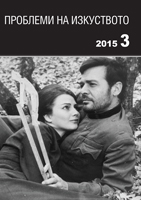Българското късометражно игрално кино (1948-1991)
Bulgarian Shorts (1948–1991)
Author(s): Petia AlexandrovaSubject(s): History, Fine Arts / Performing Arts, Cultural history, Visual Arts, Recent History (1900 till today), Film / Cinema / Cinematography
Published by: Институт за изследване на изкуствата, Българска академия на науките
Summary/Abstract: The article renders systematic the feature shorts of the period 1948– 1991. Feature short is an operational term for a film the running time of which is less than one hour and on a rare occasion, for a film built on certain dramaturgic and aesthetic principles. Several models are being considered concerning the structure and the thematic orientation of the works. The most spread type is a feature film of several short stories, filmed by the same director, but with storylines in their own right, united by a common creative manner and more often than not using a dramatic glue to hold the narrative thread together (e.g. The Penleve Case and Men on a Business Trip). Often it is the genre that binds them together: in Bulgarian practice, this model is most popular with comedies and children’s flickers (Porcupines Are Born without Bristles and Children Play Out-of-Doors ). Yet another model is a combination of short films by different directors, united by the same idea or subject. This is again made predominantly in genre films, for instance in the comedies Marital Jokes and Divorces, Divorces.... Aesthetically, more interesting are those experiments where individual stories are not bound together at a purely thematic level, but rather at a deeper one: Armando. The White Horse, A Moment of Freedom (The Old Man and I Want to Live), At Dawn, and especially Colourful World. Still, a risk of an unbalanced proportion between the short films in terms of their artistic qualities is possible here. The last model is that of one-piece shorts. Some of these have never been offered for screening in whatever combinations and have remained almost unknown. These works offer the greatest variety of sub-genres: poems, satires, experiments, impressions, etc.: Vaskata, The Dash, Looking for a Remembrance, Jesse James vs. Lokum Shekerov, A Shooting Day and Where We Have Met?. In the 1980s, filmmakers viewed shorts more pragmatically as a chance to make their debut or make it into TV. Thus new directors with new films appeared on the stage: A Woman for Monasi, Unnecessary Entr’acte and Night Rate.
Journal: Проблеми на изкуството
- Issue Year: 2015
- Issue No: 3
- Page Range: 27-30
- Page Count: 4
- Language: Bulgarian
- Content File-PDF

